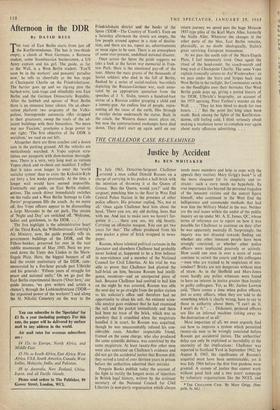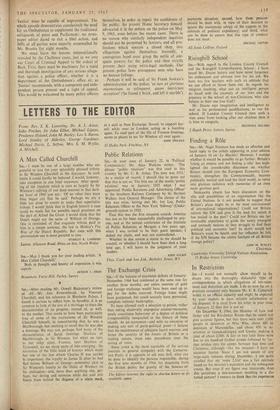THE CHALLENOR CASE RE-EXAMINED
Justice by Accident
By BEN WHITAKER
TN July 1963, Detective-Sergeant Challenor 'arrested a man called Donald Rooum on a charge of carrying in his pocket a half-brick with the intention of throwing it at the Queen of Greece. 'Boo the Queen, would you?' said the sergeant, punching him to the floor' in West End Central Police Station in the presence of other police officers. His prisoner replied, 'No, not at all.' Once again Challenor beat him about the head. 'There you are, my old darling, have that with me. And just to make sure we haven't for- gotten it . . . there you are, my olcj, beauty. Carrying an offensive weapon. You can get two years for that.' The officer produced from his own pocket a piece of brick wrapped in news- paper,
Rooum, whose talented political cartoons in the Spectator and elsewhere Challenor had probably never looked at, happened to be a firm believer in non-violence and a member of the National Council for Civil Liberties. At his trial he was able to prove that Challenor had planted the half-brick on him, because Rooum had intelli- gence, resources—and an unexpected piece of luck. Because Challenor had omitted to bail him on the night he was arrested, Rooum was able the next day to go straight from the police station to his solicitor's office and therefore had no opportunity to clean his suit. An eminent scien- tific analyst gave evidence that he had examined the suit and the pocket immediately and there had been no trace of the brick, which was so powdery that it crumbled when the magistrate handled it in court. So Rooum was acquitted, though he was unaccountably refused his con- siderable costs. Another respectable friend, framed on the same charge, who also produced the same scientific defence, was convicted by the same magistrate. At least twenty-five other men were also convicted on Challenor's evidence and did not get the accidental justice that Rooum did; they served a total of over thirteen years in prison before the authorities admitted their mistake.
Penguin Books publish today the account of the fight to rectify the longest series of injustices in British legal history, written by the assistant secretary of the National Council for Civil Liberties (a non-party organisation which always
needs more members and help to cope with the appeals they receive). Mary Grigg's book* is all the more eloquent for its simplicity and re- straint : such a story needs no hyperbole. Its true importance lies beyond the personal tragedies of the innocent victims and the central figure himself, who continued in the West End the belligerence and commando methods that had won him the Military Medal in the war. Neither are the real issues within the ambit of the public inquiry set up under Mr. A. E. James, QC, whose terms of reference are to report on how it was possible for Challenor to continue on duty after he was apparently mentally ill. Surprisingly, the inquiry was not directed towards finding out whether any other innocent people have been wrongly convicted, or whether other police officers were implicated passively or actively. How could one man in over a score of cases continue to outwit the courts and his colleagues —men who are trained to be suspicious of mis- conduct? Bricks are not dangerous without men of straw. As in the Sheffield and Mars-Jones cases hardly any police witnesses were found to have an interest in justice greater than loyalty to guilty colleagues. Yet, as Mr. Justice Lawton said, 'There comes a time when police officers, just as army officers, when they are told to do something which is clearly wrong, have to say to those in authority above them, "I can't do it. I won't do it." . . . Dishonest, perjured officers are like an infernal machine ticking away to the destruction of us all.'
Most important of all, we must urgently find out how to improve a system which permitted twenty-six men to be wrongly convicted before Rooum got accidental justice. The authorities' delay can only be explained as incredulity at the enormity of the implications: Challenor was reported to Scotland Yard in September 1962; by August 8, 1963, the significance of Rooum's acquittal must have been unmistakable; yet it was July 1964 before the first free pardons were granted. A system of justice that cannot work without good luck and a two years' campaign by voluntary organisations like the NCCL and * THE CHALLENOR CASE. By Mary Grigg. (Pen- guin, 3s. 6d.)
'Justice' must be capable of improvement. The whole episode demonstrates conclusively the need for an Ombudsman to supplement the traditional safeguards of press and Parliament: no news- paper editor dared to risk a libel action, and MPs of all parties were expertly stonewalled by Mr. Brooke for eight months.
We must learn the lessons unintentionally revealed by the Challenor cases, just as we owe our Court of Criminal Appeal to the ordeal of Beck. First, there must be machinery for a rapid and thorough investigation of any serious allega- tion against a police officer, whether it is a department of the Ombudsman's office or, as `Justice' recommends, with a competent and inde- pendent person present and a right of appeal. This would be welcomed by many police officers themselves, in order to repair the confidence of the public; the present Home Secretary himself advocated it in the debate on the police on May 9, 1963, even before the recent cases. There is no reason why similarly independent inquiries should not be permitted by lawyers, and all pro- fessions which operate a closed shop, into allegations against themselves. Secondly, a courageous hand must grasp the nettle of ade- quate powers for the police and then strictly prevent their using extra-legal methods. Our present police laws presuppose men who have no human failings.
Perhaps it will be said of Sir Frank Soskice's administration of the police, `tit lure sit gloriatus marmorean se relinquere, quam latericiam accepisset' ('he found it brick, and left it marble').



































 Previous page
Previous page